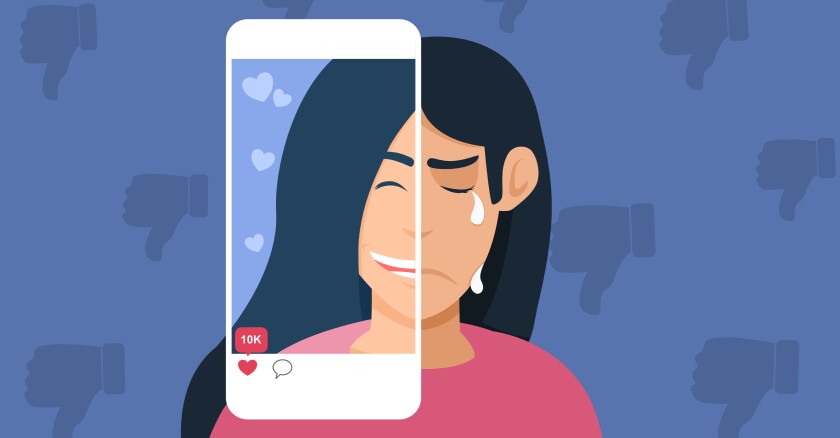That is why she has dedicated her career to connecting the dots between technology overuse/misuse and mental health problems. She is not a Luddite, far from it — she tests out new technologies like ChatGPT and other AI tools and believes technology has a meaningful role in teaching and learning. But she has grave concerns that many kids in the current generation are using technology in ways that are driving them into a mental health hole that will prevent them from reaching their true potential academically and personally. And Strohman — the author of Unplug: Raising Kids In A Technology Addicted World, and Digital Distress: Growing Up Online — believes schools and parents can help turn the tide in a better direction.
Education Week spoke with Strohman via Zoom about her work. This interview was edited for brevity and clarity.
Walk into a school and you often see kids at a table together, all on their phones, not talking to each other. What are the downsides of that kind of behavior?
I go into schools and look at their tech policies, I look at their school lunches, and I walk the campus because I want to see how they're managing that [challenge]. It is one of the biggest complaints about recess in the elementary schools or lunches in middle and high school. What it does to the kids is it really gives them a buffer and an excuse. It gives them the ability to manage their decision-making based upon a phone, and they don't really have to have the difficult conversations or learn how to create a conversation. So eye contact is gone.
Tell us about the work you're doing with schools.
I created a program called Digital Citizen Academy that was my effort as a clinical psychologist working with families for almost two decades to give support where I could see it needed to be. I did a K-8 program so we can start in elementary school. The approach is really going to the school, help the school understand: What is your tech policy? How are you creating a partnership with the parents? Because the shift that I saw for almost a decade was that schools would say these devices were the parents' issue because they're buying them for their kids. And the parents would say, "But you've got my kid for eight hours a day, so why aren't you fixing it?" And so there's been a standoff.
And, so, I came in and I was like, "Hey, look, we can actually educate both of them." We can have the parents go through a parent program that gives them the education on the research, the structural damage, the neurochemical damage, the things that happen from a technology-overuse standpoint, and we can get them educated and then we can get the kids [involved]. They are the most powerful technological cohort in history, and the industry is banking on them being siloed and separated without being able to band together and understand that they have a voice. We teach kids how to become ambassadors in this space, not just in their school, but in the policies that are going to be upcoming that are influencing them.
The expanded use of artificial intelligence is a huge issue in schools. How do you think the rising use of AI-driven technologies such as deepfake videos will affect students' mental health?
Well, it terrifies me. The deepfakes are challenging because you have to think through the developmental appropriateness of a student. So if you have a 13-year-old and a peer creates a false picture of them and then circulates it through the school, the 13-year-old victim of that circulation doesn't really have a voice or a platform to be able to argue against it before the social and psychological damage has occurred. And so it doesn't matter anymore if it's true or not. So there's a lot of damage that's starting to occur in a very quick way.
I've done a lot of trainings on [AI and ChatGPT] and I've talked about it a lot because I think that schools are missing an opportunity if they just say, "You can never use it" and they ban it. How do we use it and understand the limitations on it? Oftentimes, I'll tell kids, "Test it out." It's a really good opportunity to teach around it, how to use it and what it's appropriate for.
What is your advice to educators about how to help students find a better balance in their use of technology?
That's a great question. I talk about the "power of one" a lot. I have such a respect for the relationship that a teacher can have with a student. And in terms of the tech in it, I think that having every teacher understand that it's OK to tell your students: "Listen, the world is moving very fast. You've got a lot of influences coming at you through these platforms, but I'm here and I'm a person who you can trust." And as much as they possibly can, have that open door for those kids so they can come in and just talk.
©2024 Education Week (Bethesda, Md.). Distributed by Tribune Content Agency, LLC.















